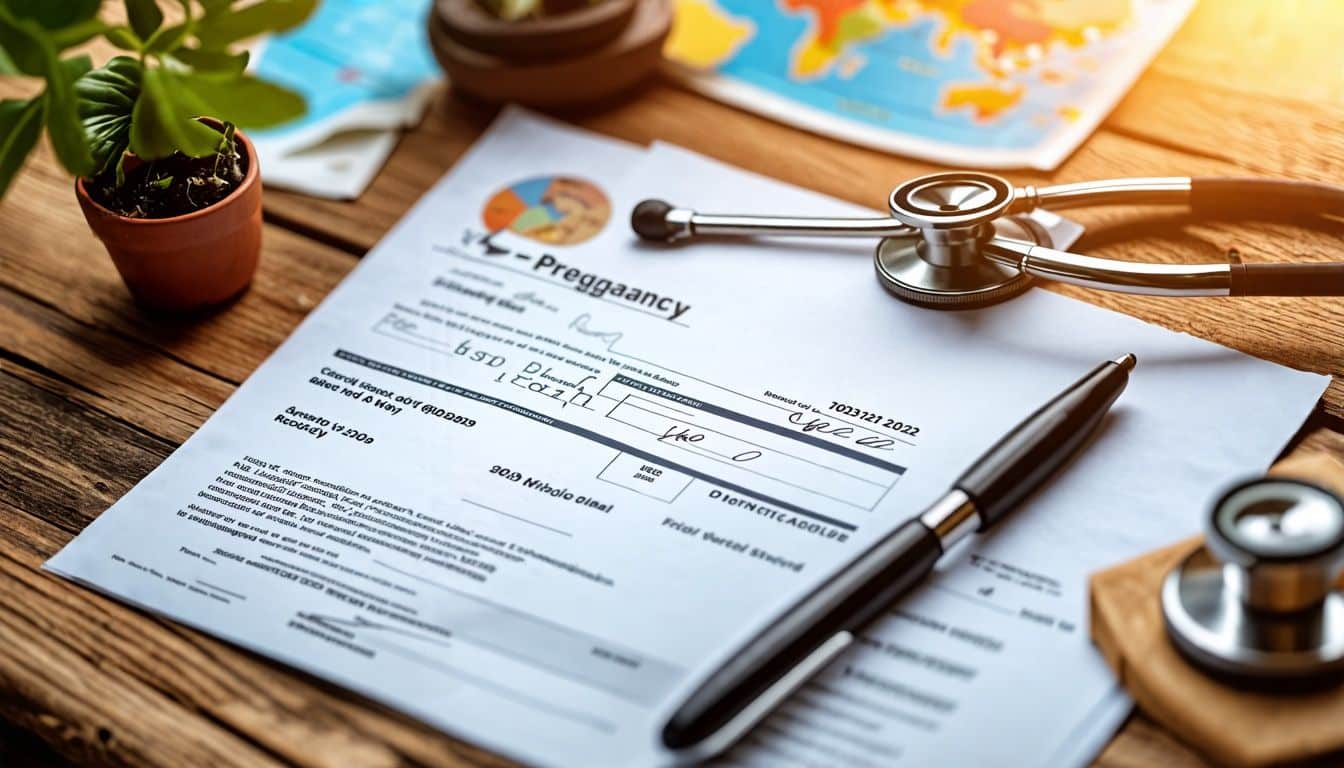Verification And Authenticity Of Fit To Fly Certificates For Pregnancy
Pregnant travellers often worry about getting the right paperwork for flying. Airlines require fit-to-fly certificates for expectant mothers after 28 weeks of pregnancy. This article will guide you through verifying and ensuring the authenticity of these vital documents.
Read on to learn how to travel safely and stress-free during pregnancy.
What is a Pregnancy Fit-to-Fly Certificate?

A Pregnancy Fit-to-Fly Certificate is a must-have document for expectant mothers who plan to travel by air. It confirms that a pregnant woman is safe to fly and typically includes details about her due date and any relevant medical conditions.
Definition
A pregnancy fit-to-fly certificate is a crucial document for expectant mothers planning air travel. It’s an official statement from a healthcare professional confirming the safety of flying during pregnancy.
This certificate typically becomes necessary after 28 weeks of gestation. Airlines require this proof to ensure the well-being of both mother and baby during the journey.
The purpose of this medical evidence extends beyond mere formality. It serves as a safeguard against potential complications that may arise from air travel during pregnancy. The document usually includes details such as the expected due date and any relevant medical conditions.
Understanding what a fit-to-fly certificate entails leads us to explore its importance in verifying authenticity.
Purpose
Fit-to-fly certificates for pregnancy serve a crucial safety purpose. They confirm that expecting mothers can travel safely by air after 28 weeks of gestation. Airlines require these documents to protect both the mother and unborn child during flights.
The certificates assure that the pregnancy is progressing normally without complications.
These vital documents help airlines comply with safety regulations. They also give peace of mind to pregnant travellers.
Their documents are internationally recognised and feature QR codes for easy verification. This ensures authenticity and helps prevent fraudulent use of fake certificates.
What is typically included
Having established the purpose of a pregnancy fit-to-fly certificate, let’s explore its contents. A typical certificate includes several crucial elements to ensure its validity and usefulness for airlines.
- Patient details: Full name, date of birth, and contact information of the pregnant traveller.
- Gestational age: The current week of pregnancy, often calculated from the last menstrual period.
- Expected due date: The estimated delivery date, crucial for airlines to assess travel safety.
- Medical assessment: A statement confirming the pregnancy is progressing normally without complications.
- Doctor’s information: Name, registration number, and contact details of the issuing healthcare professional.
- Date of issue: When the certificate was created, as its validity may be time-sensitive.
- Signature and stamp: Official endorsement from the medical practitioner for authenticity.
- QR code: A matrix barcode for quick digital verification of the certificate’s legitimacy.
- Airline-specific information: Any additional details required by particular carriers.
- Travel dates: The intended period of travel, if known at the time of issuance.
- General health status: Brief overview of the patient’s overall wellbeing, relevant to air travel.
The Importance of Verification and Authenticity
Verifying fit-to-fly certificates for pregnancy is crucial. It protects expectant mothers and airlines from potential risks.
Ensuring accuracy
Accuracy in pregnancy fit-to-fly certificates is crucial. These documents confirm the safety of air travel for expectant mothers after 28 weeks gestation. Reputable providers like Medical Cert offer same-day certificates issued by UK-registered doctors.
Their certificates include QR codes for easy validity checks by airlines.
Legitimate fit-to-fly letters are essential for pregnant travellers. They must be signed and stamped by qualified medical professionals. Services like Updoc UK provide verified authenticity.
This allows passengers to prove their certificate’s legitimacy quickly. Ensuring accuracy protects both the mother and baby during flights.
Validity for airlines
Airlines require valid fit-to-fly certificates for pregnant passengers. These documents confirm safe air travel after 28 weeks of pregnancy. Most carriers recognise certificates issued by UK-registered doctors.
Medical Cert provides same-day pregnancy fit-to-fly certificates with QR codes for easy verification.
Legitimate certificates ensure compliance with airline regulations. They protect both the expectant mother and baby during flights. Updoc UK offers verified authenticity services for these documents.
This allows travellers to easily prove the legitimacy of their certificate to airline staff.
Potential consequences of fraudulent certificates
Fraudulent fit-to-fly certificates for pregnancy can lead to serious consequences. Airlines may deny boarding to expectant mothers with fake documents, causing travel disruptions and financial losses.
More critically, flying without proper medical clearance puts both the mother and baby at risk. Complications like deep vein thrombosis or pre-eclampsia could arise mid-flight without appropriate precautions.
Legal ramifications also exist for using false medical certificates. Individuals caught with fraudulent documents may face fines or criminal charges. Healthcare providers issuing fake certificates risk losing their professional licenses and facing malpractice suits.
To avoid these issues, pregnant travellers should obtain legitimate fit-to-fly certificates from reputable sources. Let’s explore some trustworthy options for acquiring these vital documents.
Reputable Sources for Pregnancy Fit-to-Fly Certificates
Trustworthy sources for pregnancy fit-to-fly certificates are crucial. They ensure the safety of expectant mothers during air travel. Reliable providers use secure systems to protect patient data.
They employ strict access controls and encryption methods. This safeguards sensitive medical information from unauthorised access. Reputable sources also have qualified healthcare professionals to assess each case.
They consider factors like gestational age and any pregnancy complications. Want to learn more about finding reliable certificate providers? Read on for valuable insights and tips.
GP clinics
GP clinics are reliable sources for pregnancy fit-to-fly certificates. These medical facilities employ registered doctors who can assess a pregnant woman’s health and issue valid documents.
UK-based GP clinics often provide same-day services, ensuring quick turnaround for expectant mothers planning air travel.
Many GP clinics offer digital healthcare solutions for fit-to-fly certificates. They use secure servers and encryption to protect patient data while issuing tamper-proof documents.
Some clinics include QR codes on their certificates, allowing airlines to easily verify authenticity. This approach enhances patient safety and streamlines the verification process for air travel during pregnancy.
Online services
While GP clinics offer in-person services, online platforms have revolutionised the process of obtaining fit-to-fly certificates for pregnant travellers. These digital healthcare services provide a convenient alternative to traditional methods.
Medical Cert, for instance, offers same-day pregnancy fit-to-fly certificates issued by UK-registered doctors without the need for appointments.
Online services often incorporate advanced security measures to ensure data privacy and authenticity. Many use two-factor authentication and role-based access control to protect sensitive information.
Updoc UK, for example, provides verified authenticity for fit-to-fly certificates through QR codes. This allows pregnant travellers to easily confirm the legitimacy of their document with airlines.
These digital solutions streamline the process, making it easier for expectant mothers to comply with airline regulations and ensure a safe, smooth travel experience.
Customer reviews
Customer reviews play a crucial role in verifying the authenticity of pregnancy fit-to-fly certificates. They offer valuable insights into the reliability and credibility of certificate providers.
- Trustworthy feedback: Reviews from pregnant travellers who have used a specific service can confirm the acceptance of certificates by airlines. For instance, comments about Medical Cert’s same-day certificates being recognised internationally are reassuring.
- Experience sharing: Customers often detail their experience with the certification process. This might include information about the ease of obtaining a certificate or the professionalism of the healthcare practitioners involved.
- Verification confirmation: Reviews may mention the presence of QR codes on certificates, allowing for quick validity checks. This feature, offered by some providers, enhances the authenticity of the document.
- Timeliness indicators: Feedback often highlights the turnaround time for receiving certificates. Same-day service, as offered by some providers, can be crucial for last-minute travel plans.
- Provider comparisons: Reviews enable expectant mothers to compare different certificate issuers. This helps in choosing a reputable source that meets airline requirements and ensures safety during air travel.
- Compliance confirmation: Customer feedback can verify if the certificates comply with general data protection regulation (GDPR) standards, ensuring the protection of sensitive health information.
- Support assessment: Reviews often mention the level of customer support provided. This can be vital if issues arise or clarifications are needed regarding the fit-to-fly certificate.
- Cost considerations: Feedback frequently includes comments on pricing, helping pregnant travellers make informed decisions based on their budget and needs.
- Medical expertise evaluation: Reviews may touch upon the qualifications of the medical practitioners issuing the certificates, providing assurance about their professional competence.
- Ease of use: Feedback often highlights the user-friendliness of online services for obtaining certificates, including aspects like two-factor authentication (2FA) for secure access to health information.
Obtaining a Certificate from [https://medicalcert.co.uk/pregnancy-fit-to-fly-certificate/](https://medicalcert.co.uk/pregnancy-fit-to-fly-certificate/)
Medicalcert.co.uk offers a straightforward process for obtaining pregnancy fit-to-fly certificates. UK-registered doctors issue these documents, which are recognised internationally by all airlines.
The certificates come with QR codes for easy validity confirmation, ensuring authenticity and compliance with airline regulations.
Pregnant travellers can get their fit-to-fly certificate without an appointment, often on the same day. This service is crucial for expectant mothers planning air travel after 28 weeks of pregnancy.
It provides assurance that the pregnancy is progressing normally, free from complications that might affect air travel safety.
Conclusion
Pregnancy fit-to-fly certificates are crucial for expectant mothers planning air travel. Verifying these documents ensures safety and compliance with airline rules. Reputable sources like GPs and trusted online services offer authentic certificates.
Pregnant travellers should always confirm their certificate’s legitimacy before flying. This simple step can prevent issues and provide peace of mind for a smooth journey.
FAQs
1. What is a Fit to Fly Certificate for pregnancy?
It’s a document from a GP or midwife. It states a pregnant woman is safe to travel by air. Airlines like Ryanair and EasyJet often require these.
2. How do doctors verify the authenticity of these certificates?
Doctors check the General Medical Council (GMC) number. They also look at professional qualifications. Some use encrypted systems to protect patient data.
3. What medical checks are done before issuing a certificate?
GPs perform a physical exam. They review medical history and antenatal records. Tests for anaemia, gestational diabetes, and high blood pressure are common.
4. Can telemedicine be used for Fit to Fly assessments?
Yes, some doctors use telehealth for initial screenings. But a physical exam may still be needed. This helps prevent false information in certificates.
5. How do airlines protect sensitive data in these certificates?
Airlines use pseudonymisation and encryption. They have strict password policies. This protects against phishing scams and data breaches.
6. What health conditions might prevent a pregnant woman from flying?
Deep vein thrombosis risk is a concern. Sickle cell disease can be problematic. Recent surgeries like laparoscopic cholecystectomy may also restrict flying.


